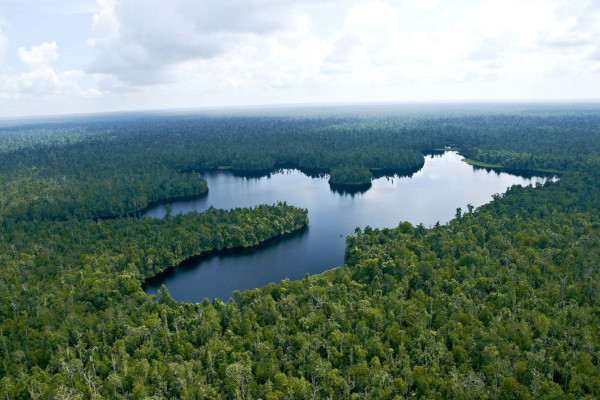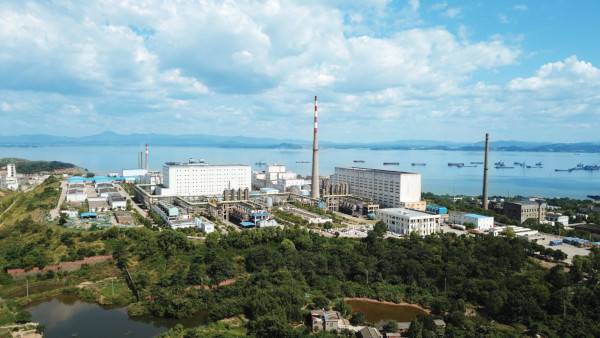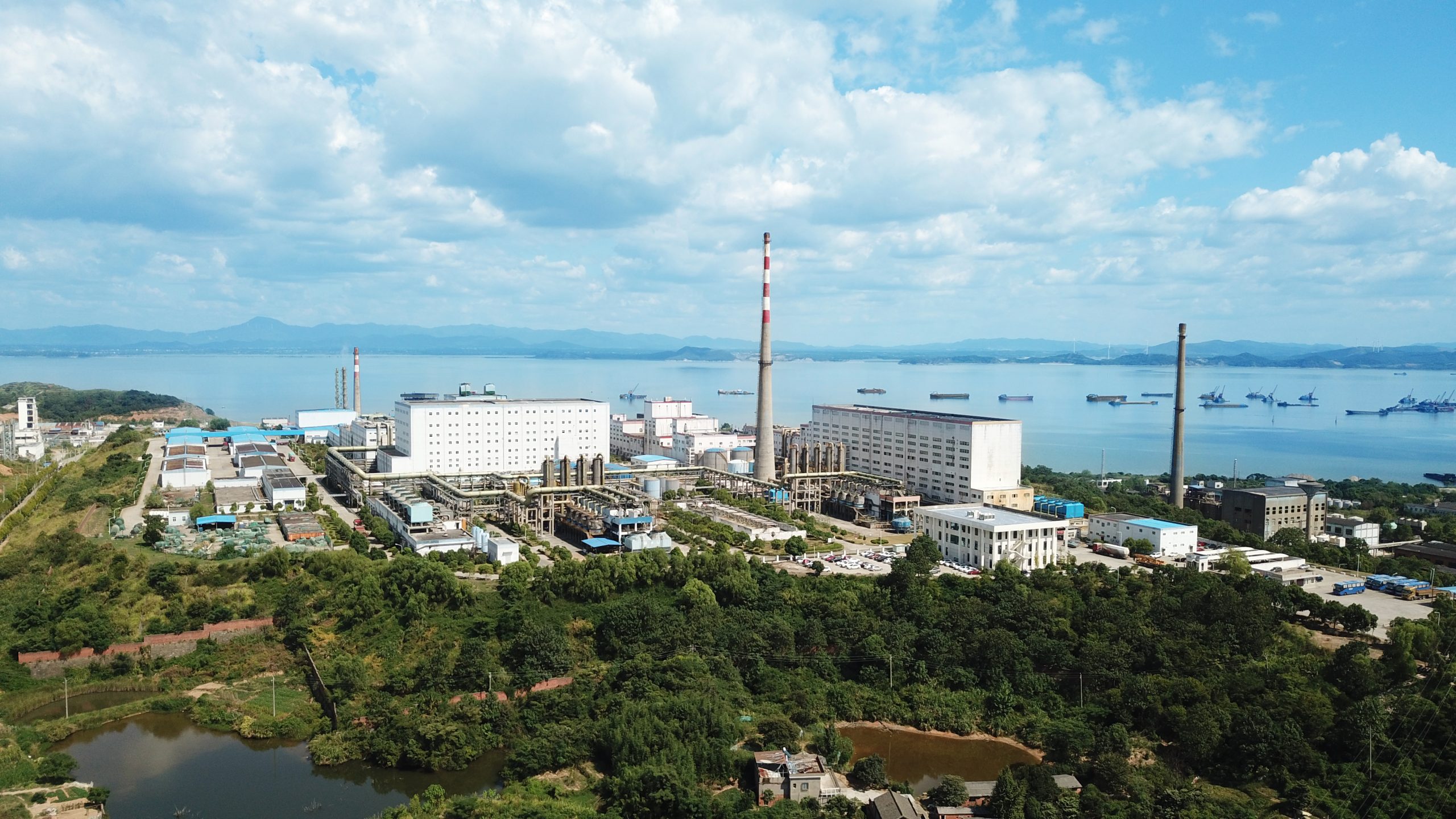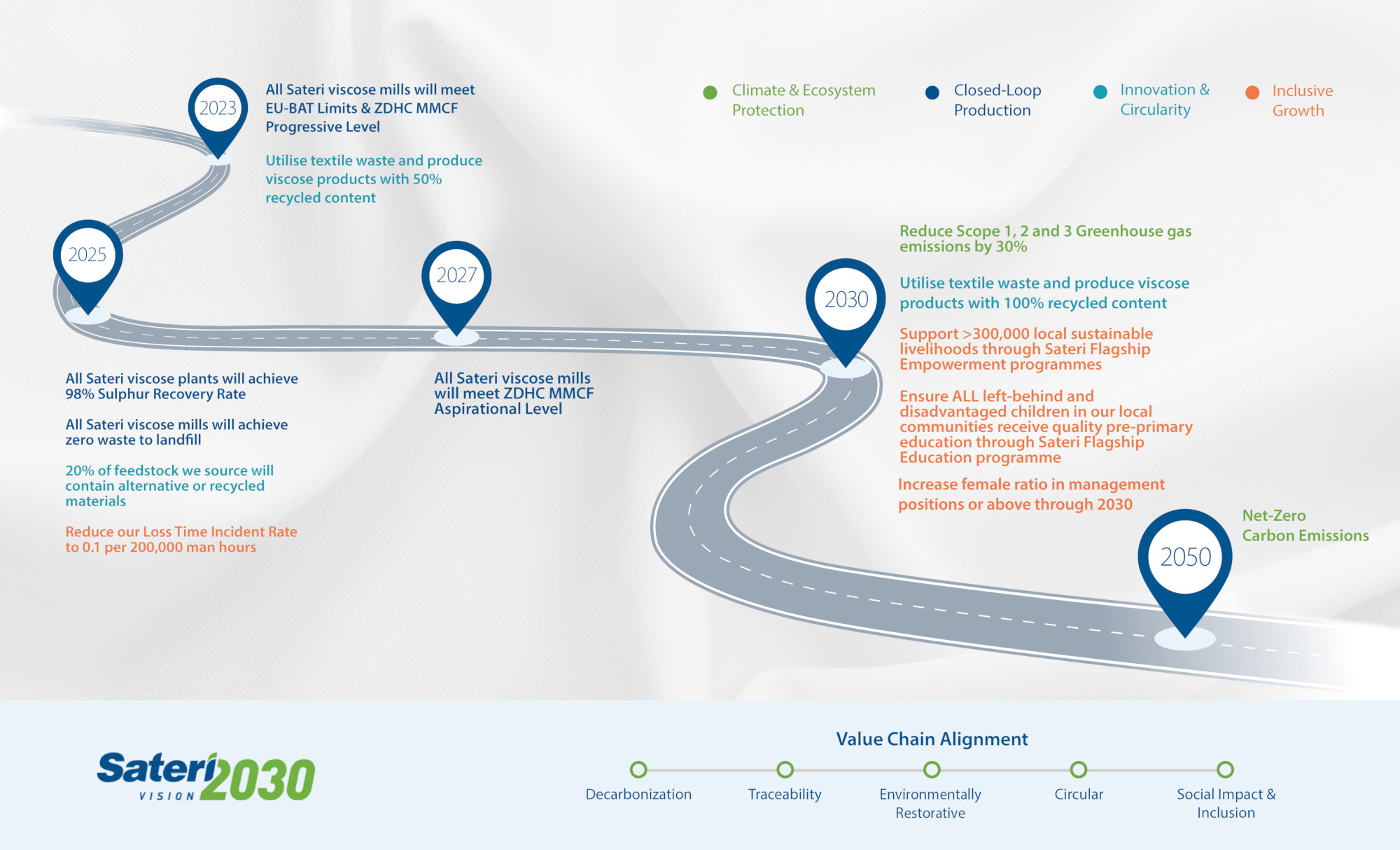Vision 2030
Sateri 2030 Vision: Our Decade of Change & Action
Sateri aspires to be the world’s leading net-positive fibre producer, putting more back into our society than we take out. Sustainability will be Sateri’s defining market differentiator underpinning our continued growth in volume and value;value to the community, country, climate, customer and company.


Climate and Ecosystem Protection
Achieve net-zero carbon emissions by 2050, and contribute to a net positive state of nature through supporting the protection, restoration and regeneration of the land and freshwater ecosystems across our value chain footprint.We aim to achieve net-zero carbon emissions by 2050, and reduce Greenhouse Gas emissions in Scope 1, 2 and 3 by 30% by 2030 against a baseline no earlier than 2015. We are in the process of setting Science-based GHG emission reduction targets to define our climate commitments.
We will develop science-based Biodiversity Strategy to guide that our effort towards planetary biodiversity goals.
... more
Closed Loop Production
Build a clean and closed-loop production system, and to produce with zero harm through radical reduction of emissions and zero discharge of hazardous materials.Our ambition is to have all our viscose mills achieve the Aspirational Levels of ZDHC MMCF Guidelines with respect to chemical recovery, wastewater discharge and air emissions by 2027. The Guidelines are the point of reference of viscose sector-wide best practice currently available.
As a step-wise approach to that goal, we aim to have all Sateri viscose mills meet the EU-BAT requirements in resource efficiency and emission control by 2023. We will also further reduce water intensity beyond EU-BAT levels. To reduce water impacts, we commit to developing advanced wastewater recycling systems and significantly increase wastewater recycling rates.
Our approach to reduce Sulphur emissions to air and in water is through maximizing Sulphur recovery in our production process. We commit to achieving 98% Sulphur recovery rate at all Sateri plants by 2025.
We also commit to achieving zero waste to landfill at all plants before 2025.
... more


Closed Loop Production
Build a clean and closed-loop production system, and to produce with zero harm through radical reduction of emissions and zero discharge of hazardous materials.Our ambition is to have all our viscose mills achieve the Aspirational Levels of ZDHC MMCF Guidelines with respect to chemical recovery, wastewater discharge and air emissions by 2027. The Guidelines are the point of reference of viscose sector-wide best practice currently available.
As a step-wise approach to that goal, we aim to have all Sateri viscose mills meet the EU-BAT requirements in resource efficiency and emission control by 2023. We will also further reduce water intensity beyond EU-BAT levels. To reduce water impacts, we commit to developing advanced wastewater recycling systems and significantly increase wastewater recycling rates.
Our approach to reduce Sulphur emissions to air and in water is through maximizing Sulphur recovery in our production process. We commit to achieving 98% Sulphur recovery rate at all Sateri plants by 2025.
We also commit to achieving zero waste to landfill at all plants before 2025.
... more

Innovation & Circularity
Realise the Net Positive potential of MMCF by leading in innovation and driving circularity across our value chain.We commit to utilizing textile waste and produce viscose products with 50% recycled content by 2023 and 100% by 2030. By 2025, 20% of the feedstock we source will contain alternative or recycled materials.
... more
Inclusive Growth
Safeguard the health and safety of our employees and the communities and to create shared values and prosperity through innovation and care.We aspire to build a safe, healthy and happy workplace for all. We strive to achieve zero incidents and zero occupational diseases today, tomorrow and everyday - through 2030, and beyond. By 2025, we’ll reduce our Loss Time Incident (LTI) Rate to below 0.1 per 200,000 working hours and have developed Personal Development Plans for 100% of our employees. We will also increase the ratio of women in management positions through 2030. We respect the human and labour rights of all and will work to ensure that our suppliers do the same, including acknowledging the rights of indigenous people and rural communities to give or withhold their Free, Prior and Informed Consent (FPIC).
We strive to build a better life for all through community empowerment and education. By 2030, we will support more than 300,000 local families and smallholder farmers to develop needed skills for maintaining sustainable livelihoods through the Sateri Flagship Empowerment programmes. We will also ensure all left-behind and disadvantaged children in our local communities receive quality pre-primary education, through Sateri Flagship Education programmes.
... more


Inclusive Growth
Safeguard the health and safety of our employees and the communities and to create shared values and prosperity through innovation and care.We aspire to build a safe, healthy and happy workplace for all. We strive to achieve zero incidents and zero occupational diseases today, tomorrow and everyday - through 2030, and beyond. By 2025, we’ll reduce our Loss Time Incident (LTI) Rate to below 0.1 per 200,000 man hours and have developed Personal Development Plans for 100% of our employees. We will also increase the ratio of women in management positions through 2030. We respect the human and labour rights of all and will work to ensure that our suppliers do the same, including acknowledging the rights of indigenous people and rural communities to give or withhold their Free, Prior and Informed Consent (FPIC).
We strive to build a better life for all through community empowerment and education. By 2030, we will support more than 300,000 local families and smallholder farmers to develop needed skills for maintaining sustainable livelihoods through the Sateri Flagship Empowerment programmes. We will also ensure all left-behind and disadvantaged children in our local communities receive quality pre-primary education, through Sateri Flagship Education programmes.
... more

President's Message
Sateri has come a long way since 2002 when we established our presence in China. We were China’s first wholly foreign-owned cellulose enterprise, responding to the country’s opening up to foreign investments when it joined the World Trade Organisation the year before.From our first viscose mill in Jiangxi, we have grown to five viscose mills with over 1.5 million tonnes annual capacity to become the world’s largest viscose producer within two decades. Along the way, we added yarn and more recently, lyocell, recycled fibre and non-woven fabrics to our product portfolio.
As we enter a new decade, we will continue to grow and diversify our product offerings to our customers, and remain a vital raw material supplier. But our growth strategy cannot be based on just volume and scale. We want to be a value and purpose-driven company, and there are compelling reasons for us to do so.
Climate Change and Our Industry
In the recent decades, the global community and our industry are confronted with the increasing reality of climate change and its devastating impacts. The apparel industry is a large emitter of greenhouse gas and produces 20% of the world’s waste water. 73% of the world’s clothing end up in landfill or incinerator. The COVID-19 pandemic has further shown us how the most vulnerable and lowest paid communities in the fashion supply chain can be affected.Faced with this reality, there is a rallying call for the industry to address environmental pollution and social challenges. The industry now looks to be more regenerative and redistributive, reducing its footprint and impacts to air, land and ocean.
Our New Growth Model
As a raw material supplier, Sateri needs to and will do our part to respond to the urgency of decoupling growth from further resource impact. This is something that will underpin our growth in addition to QPC (Quality, Productivity, Cost) and continuous improvement which are well-embedded in the company.Sateri’s sustainability efforts today focus on policies, certifications, engagement and transparency. We published our first sustainability report in 2017. We have attained all major international certifications; going beyond national standards and compliance. We adopted a set of 2020 goals in 2017, of which we have achieved the majority. For goals that we fell short of, we will accelerate our efforts to achieve them.
As 2020 draws to a close, we are charting the next course of goals and actions.
Sateri 2030 Vision: Our Decade of Change and Action
I am pleased to announce today the adoption of the Sateri 2030 Vision and its accompanying roadmap and targets. The Vision articulates how we aspire to grow in a way that we put back more into the environment and society than we take. The goals we set cover all dimensions of sustainability - social, economic, and environment - and are measurable and time-bound.The vision and goals are borne from months of robust internal discussions, benchmarking of industry best practices, and stakeholder consultations. The formulation of Sateri 2030 Vision is also informed by the results of our UNSDG (United Nations Sustainable Development Goals) prioritisation exercise which analysed and reviewed Sateri’s current social and economic contributions to our areas of operations in China.
The road to realising Sateri 2030 Vision will be paved with challenges, including decarbonisation through cleaner energy sources. But the impacts will be deep and meaningful. We will hold ourselves accountable by communicating our progress through our annual sustainability report and online sustainability dashboard.
I firmly believe that Sateri 2030 Vision will bring us closer to our customers, employees and communities, and make us more resilient as a business. We have the will, the resources and the business case; I am confident we will achieve the goals we have set and even go far beyond.
Sustainability will underpin our growth in the coming decade – there’s no two ways about it. Our customers and stakeholders ask for it, but more than that, we demand so for ourselves and for our future generations.
Allen Zhang
2 November 2020
... more
Roadmap & Targets
2020
- Source responsibly in line with Sateri’s pulp sourcing policy
- Support science-based conservation and restoration of natural ecosystems in landscapes where Sateri and our supply chain operate
- Identify renewable energy sources for adoption
- Source certified /controlled wood pulp
- Further reduce Water Intensity beyond EU-BAT level
- Significantly increase Wastewater Recycling Rate
- Aspire to reach Zero Incidents and Zero Occupational Disease in our operations
- Increase female ratio in management positions
2023
- All viscose mills will meet EU-BAT limits
- All viscose mills will meet ZDHC MMCF Progressive Level
- Utilize textile waste and produce viscose products with 50% recycled content
2025
- All viscose mills will achieve 98% Sulphur recovery rate
- All viscose mills will achieve zero waste to landfill
- 20% of the feedstock will contain alternative or recycled materials
- Reduce Lost Time Incidence Rate to 0.1 per 200,000 man hours
2027
- All viscose mills will achieve ZDHC-MMCF Aspirational Level
2030
- Reduce GHG emissions in Scope 1, 2 and 3 by 30%
- Utilize textile waste and produce viscose products with 100% recycled content
- Support > 300,000 local families & smallholder farmers
- Ensure all left behind and disadvantaged children in our local communities receive quality pre-primary education
- Increase female ratio in management positions or above through 2030











